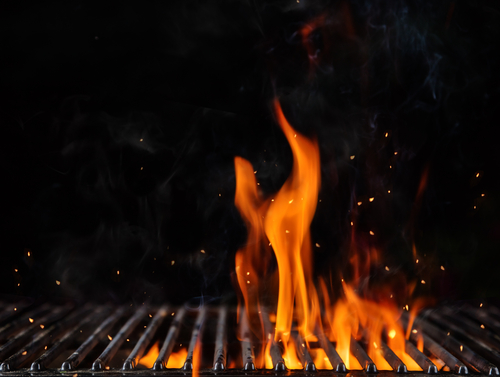Gas, charcoal and disposable BBQs are safe when used responsibly and our BBQ safety tips are designed to ensure you stay safe. Follow our BBQ safety tips and enjoy your al fresco cooking without any risks (except for a bit of overindulging!).
BBQ safety checklist
The following BBQ safety advice contains all the essential points to keep in mind when cooking with a BBQ:
- Never use a BBQ indoors.
- This includes any temporary outdoor shelter such as tents, marquees, yurts, gazebos, playhouses, shepherd huts or igloos!
- Don’t take a lit or smouldering BBQ into a tent, caravan, or cabin. Even when you have finished cooking with it, a BBQ can still give off fumes that can give you carbon monoxide poisoning. You should always leave it outside.
- The cooking area should be well away from buildings and be well ventilated with fresh air.
- Be aware of the signs of carbon monoxide poisoning:
- Headaches
- Nausea
- Breathlessness
- Dizziness
- Collapse
- Loss of consciousness
- Always use your BBQ in accordance with the operating instructions.
- Check the BBQ for damage before use.
- When using your BBQ ensure that it is on a level ground. In the case of disposable BBQs, use on a non-combustible surface
- Ensure disposable BBQs are cold before disposing responsibly into refuse containers. Even a slightly warm BBQ could cause a fire.
Extinguishing a Grease Fire on Your Propane Grill
 Usually, cooking food on a propane grill is a cinch. But any time you’re dealing with fire and grease, accidents are always a possibility – and it’s important for you to know exactly what to do, and not to do, if you have a grease fire or flare-up.
Usually, cooking food on a propane grill is a cinch. But any time you’re dealing with fire and grease, accidents are always a possibility – and it’s important for you to know exactly what to do, and not to do, if you have a grease fire or flare-up.
Here’s the scoop about grease fire safety on your propane grill:
- Stay ready:
- When you grill, have a cell phone nearby in case you need to make an emergency call
- Keep a fire extinguisher, gloves and either baking soda, sand or kosher salt near your grill to extinguish flames.
- If you have a fire and it’s safe to do so,
- Turn off the grill’s burners.
- Remove the food and smother the flames by throwing baking soda, sand or kosher salt over it. NEVER use water to extinguish a grease fire or flare up.
- Close the lid and any grill vents to further starve the fire of oxygen.
- If the propane tank has become part of the fire, or if the fire expands out of control, evacuate the area immediately and call the fire department.
How To Avoid Grease Fires and Flare-ups
Of course, the best way to deal with grease fires and flare-ups is to avoid them in the first place. Here are the best ways to do it.
- Clean your grill regularly, following instructions from your manufacturer. Regular cleaning will greatly reduce the risk of a fire (your food will taste better, too).
- Grease sometimes pools in the fire box area around the burners. If it is safe to do so, turn off the gas and leave the lid open so the grease can burn off.
- Always cook with the lid down, and leave it down during cooking time.
- Oil the food, not the grates.
- If you experience a grease flare-up,
- Immediately move the food to a warming rack, using long-handled tongs
- Slowly re-place food at center of the grill to let fat burn off; continue this process for each item.
- Once all food has been returned to the grill, finish cooking with a watchful eye.
Gas BBQ maintenance tips
- If you’re using a gas BBQ here are some additional safety tips to keep you safe while cooking. These tips can also be applied to other gas devices like a camping stove, light, or heater:
-
Before use, check that the BBQ is in good working order and any hoses are not showing signs of wear, stiffness or cracking. If you have any doubts about the safety of a gas BBQ do not use it and contact a Gas Safe registered engineer.
- When changing your gas cylinder turn off the gas taps, and always change the cylinder in the open air.
- Don’t over-tighten joints.
- Always turn off the gas cylinder before turning off the BBQ controls to ensure that any gas left in the pipeline is used up.
- The instructions that come with your BBQ should detail how to check for gas leaks. This often involves coating joints with a leak detection solution and then watching for bubbles. Be sure to follow these instructions before using the BBQ to check for any problems. If you find a leak do not use the BBQ and consult the instructions for further advice.
- Leave gas powered stoves, lights, or heaters outside in the fresh air at all times to prevent carbon monoxide build up.
- ALWAYS follow and consult the manufacturer’s instructions for appliance specific advice on use, ventilation, maintenance and care.
- Gas components, on any appliance, should only be repaired or replaced by a competent person and this includes your BBQ
- Storage – At the end of the season thoroughly clean your BBQ, do not leave the cylinder connected when not in use, and store it in a dry environment.
Liquid petroleum gas (LPG) powered products are a feature of many summers, taken along on camping trips, to festivals, or keeping you warm on the patio in the evening. You can find out more safety advice on LPG equipment here.
